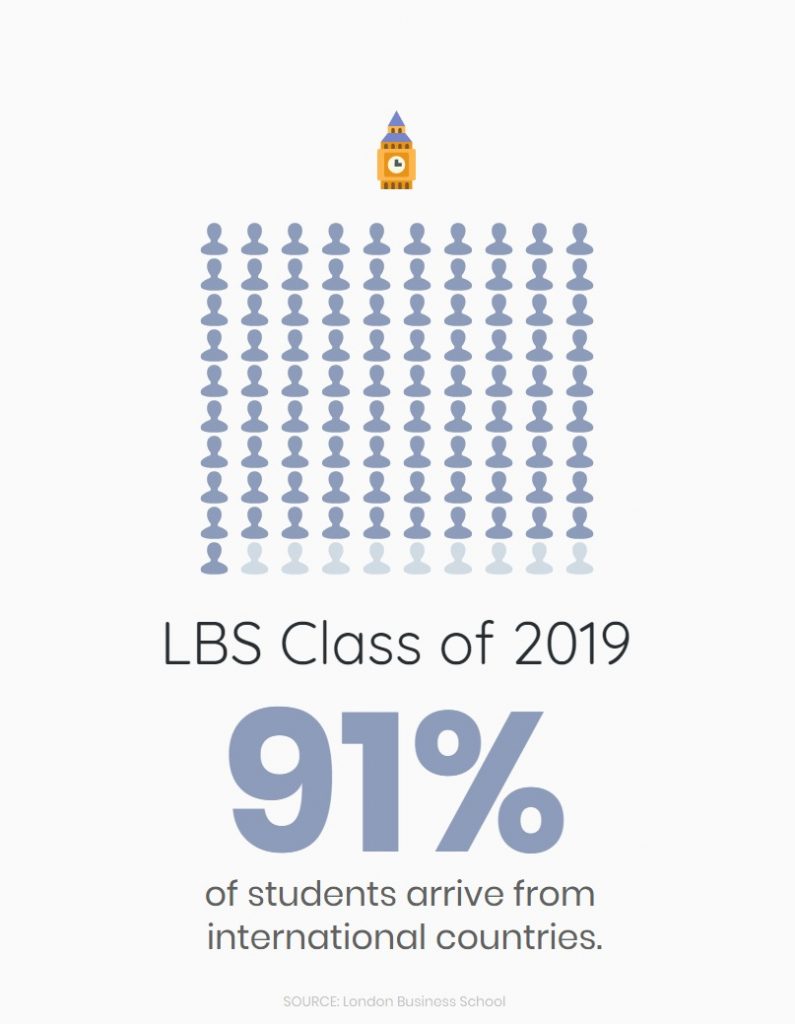From Just One Woman to 39 Percent of the Class—and Other Ways LBS Has Changed Over the Past 50 Years

The 2017-18 academic year marks the 50th anniversary of the MBA program at London Business School (LBS). Since 1968, the school has offered a two-year Master of Science (MSc) in Business Studies degree program—the original MBA—and has continuously refined its offerings since that time. In celebration of the 50-year mark, LBS is looking back at how far the program has come.
The Beginning
In 1966, two years after London Business School opened its doors, the school launched a two-year Master of Science (MSc) in Business Studies. The first class consisted of 35 men and just one woman, with the average age around 25 years old. The goal of the two-year degree was to prepare students for employment. In fact, according to the website, employment was seen as “one of the most significant aspects of the school’s progress at this stage of its development.”
After graduation, most students joined manufacturing firms, and a few went into merchant banking, management consultancy, and advertising. Their job functions included marketing and financial executives, planning personnel, and personal assistant roles.
As for the feedback on the first year of study, a report on the class stated, “The overall academic performance of the students during the year has been more than satisfactory. The course of studies is arduous and the number of hours of work required is much above average, imposing a considerable workload both on students and staff.”
The Early Years
In the early years of the program, growth was slow but steady. In 1971, the class size grew to 86 students and by 1975, 108 students were admitted, including 16 women. Throughout this time, LBS made various modifications to its program.
- In 1973, LBS introduced the International Management Program, which gave 10 students the change to study abroad in Paris or at New York University.
- In 1978, the International Management Program expanded to include Harvard, Stanford, Wharton, Chicago, and top European institutions.
The 1980s
The 1980s were a time of change for LBS and the MBA program. During these years, banking and finance overtook manufacturing as the top industry for graduates. In addition, LBS continued to increase its international reputation; about half of its class comprised non-British students by the end of the decade, with more 30 nationalities represented. Most importantly, the Class of 1987 was the first to be awarded an MBA rather than an MSc degree. In an annual report, the school stated, “This more accurately and effectively conveys the spirit of the program, and the type of qualifications our students are aiming for.”
- In 1982, LBS introduced a new part-time master’s program. The first class accepted 60 people and allowed students to complete their studies over two and a half to three years while still working.
- In 1984, three more U.S. schools joined the International Exchange Program including Dartmouth Tuck, MIT Sloan, and Northwestern Kellogg.
The 1990s
In the 1990s, LBS adopted a more flexible format for its MBA program. The school added increased training in “soft skills” and introduced computer-based management simulation games. The class size also increased to 271 students, with 79 percent of students coming from outside the United Kingdom. Consulting became the top choice for graduates, and manufacturing shrunk to just 11 percent.
- In 1992, LBS introduced a language requirement where students must be fluent in English and one other language to graduate. In addition, the part-time master’s was re-launched as the Executive MBA.
- By 1996, entrepreneurship became an important part of the program, and the school launched several electives with an entrepreneurial focus, including “Small Business Management” and “Financing the Entrepreneurial Business.”
- 1999 was the first Financial Times Global MBA ranking, and LBS ranked #1 in Europe and #8 in the world—the only non-U.S. school in the top 10.
The 2000s
By the 2000s, LBS had become a global leader in MBA education—and in 2009 it became the first non-U.S. school to top the Financial Times ranking. The MBA program was reformatted for increased flexibility, allowing students to graduate in 15 to 21 months. The class size also increased to 315 students, with 89 percent of the class from 59 countries outside the United Kingdom.
- In 2001, LBS ranked as the best Global MBA by the Financial Times, and Forbes ranked LBS as #1 in Europe and #2 in the world for return on investment.
- In 2003, LBS became the first European school to join the Forté Foundation to increase women in business, and in 2005, women made up 22 percent of the class.
The 2010s
In the last decade, London Business School once again revised its MBA program to give students even greater flexibility. The school also continued to increase its size, welcoming 468 students by 2018—12 times the size of the first class in 1968. In addition, women now make up 39 percent of the MBA class, and students represent 77 different nationalities.
- In 2010, LBS started its Incubator Program to help entrepreneurs. As of 2017, 58 businesses have completed the incubator, raising more than £31 million and creating 440 full-time jobs.
- In 2012, LBS launched the Global Business Exchange (GBE), giving students the opportunity to spend a week in another country with options ranging from South Africa to the United States.
- In 2016, LBS completed its first fundraising campaign, raising £125 million.
To learn more about the 50th anniversary celebration of London Business School’s MBA, visit the school website.
This article has been edited and republished with permissions from our sister site, Clear Admit.
Admissions Tip: The Waitlist

Last week was marked by Round 1 decision releases from a couple of the schools covered on MetroMBA and Clear Admit, and in the coming weeks, many of the remaining schools are scheduled to release R1 decisions. Clear Admit’s MBA LiveWire has captured a lot of this news, including quite a few candidates recently reporting that they’ve been waitlisted at places like London Business School and INSEAD.
For better or for worse, waitlisting is rather popular with top schools in the first round of admissions. As such, we’re devoting this week’s admissions tip to guidance for candidates who find themselves placed on a waitlist. Before we get to that, let’s look first at why schools use a waitlist.
Why Schools Use the Waitlist
First and foremost, while schools now know the quality of their Round 1 pool, they don’t yet know how strong the remainder of their applicants for this admissions season will prove, nor can they predict how many of the candidates admitted as part of Round 1 will ultimately enroll. Simply put, the waitlist helps schools manage these unknowns to arrive at the strongest possible class come fall. Some schools will “under admit” Round 1 candidates in case there is a flood of quality applicants in Round 2 or a higher yield of Round 1 candidates than predicted. The goal of the school is, after all, to admit the best overall class, regardless of when someone applies. They also do not want to over admit during an early round, which will limit their opportunities to admit strong candidates later, thus the push to “under admit,” and place significant quantities of candidates on the waitlist who may very well gain admission in later rounds. Chicago Booth explains this well on their web-site:
“The waitlist at Chicago Booth is used to gauge the pool of candidates in a subsequent round before offering a final decision to those candidates placed on the waitlist.”
Schools also can learn, by placing a candidate on the waitlist, how committed he or she is to attending the school. There is signal value in how a candidate responds to the waitlist decision. Some candidates placed on a waitlist receive offers at other schools they would prefer to attend, in which case they will opt out. Others remain convinced that the school that has waitlisted them is their best choice and will hold out to see if they can ultimately gain admission.
As well, if you are waitlisted, we’ve outlined some more advice we feel will help you on the way to earning an MBA.
Five Tips for Making the Best of the Waitlist
If you find yourself on the waitlist, don’t lose hope. Top programs admit a fair number of individuals from the waitlist in Round 2 and even later. That said, we know that cautious optimism does not make the wait for an answer any easier. To help those in this situation make sure that they’re doing all they can, we do have a few strategic waitlist tips:
Know—and follow—the rules.
Schools vary in their stances when it comes to interaction with those on the waitlist; some shun communication from applicants and even go so far as to discourage on-the-record campus visits, whereas others welcome correspondence and assign an admissions office liaison to serve the needs of waitlisted candidates.
We know that the natural impulse is to update the adcom that recent promotion or the final grade from that accounting class you took to bolster your academic profile. At first blush, a short letter or quick call to communicate this kind of update might seem harmless. But no matter how exciting the piece of news you want to share may be, ignoring the adcom’s instructions is ultimately going to reflect badly on you. Though policies discouraging communication from waitlisted candidates may seem frustrating or unfair, it’s important to respect and abide by the preferences of each school.
Communicate if you can.
For those programs that do permit or encourage contact from waitlisters—Booth, for example, has traditionally invited waitlisted candidates to submit an additional 300-word essay—it is important to provide an update. In addition to the obvious news items mentioned above, it’s beneficial to read over your essays and reflect on whether there is some piece of your background or interests that you haven’t gotten across yet. Taking the time to write about your relevant recent experiences, positive developments in your candidacy and ways that you’ve enhanced your understanding of the program is a nice sign of your interest in the school and a good strategy for telegraphing your commitment to attending. It is, of course, also in your interest to make sure that the adcom has the most up-to-date information so that it can make an informed decision the next time your file comes up for evaluation.
Keep in touch.
Don’t disappear after an initial note to the adcom or phone call to your waitlist manager (if applicable). If you have plans to be on or near campus, for instance, send a quick email to alert your waitlist manager (or whoever you may have interacted with on the adcom) to this fact. In many cases, you’ll find that the adcom will even invite you to stop by for a friendly chat about your candidacy—something that can go a long way towards helping your case. Beyond a visit, sending a brief update every few weeks or so is another way to reaffirm your interest in the school and keep you fresh in the minds of the adcom—something that could work to your advantage in a discussion of which candidates to admit from the waitlist. In all cases, it is important to remember that there is a fine line between persistence and pestering, so use good judgment!
Letters of support.
If, during the admissions process, you have interacted with students or alumni of the program, it may be worth reaching back out to these individuals and updating them on your status. Assuming you have made a positive impression during the admissions cycle, they may be willing to provide an additional letter of support for your candidacy at this stage of the process.
Have a contingency plan.
While it’s important to be consistent and enthusiastic when waitlisted and communicate with staff at your target program, it’s also wise to have a backup plan. With the Round 2 deadlines for several top programs a little over a month away, there’s still time to put together a solid application to another school. Even if you’re waitlisted at the school of your dreams and intend to reapply if not admitted, it’s also never too early to start thinking about the coming year and what steps you might take to enhance your candidacy before next fall.
Good luck to everyone waiting to receive decisions over the next few weeks!
This article has been edited and republished with permissions from Clear Admit.
Amazon Talks About Its Success and Recruiting at London Business School

It’s not that surprising to hear about Seattle-based Amazon recruiting from top U.S. MBA programs such as the University of Michigan’s Ross School of Business, where it was the number-one recruiter in 2016, hiring 31 of the school’s MBA grads. What might be more surprising is the fact that Amazon is also a big recruiter at London Business School (LBS), where it snapped up 13 Class of 2016 MBA graduates, right behind BCG, McKinsey, and Bain. When speaking to students and alumni at an LBS event, Doug Gurr, Amazon’s U.K. country manager, said, “The U.K. is an amazing location to recruit great talent, and LBS is somewhere we find the talent we need.”
Currently, the United Kingdom is a prime location for Amazon, with more than 24,000 employees and 373,000 U.K. businesses as part of its marketplace, web, and publications services. This makes recruiting in the United Kingdom easily fit into Amazon’s founding principles, which include customer obsession, passion for invention, commitment to operational excellence, and long-term thinking. As Gurr admitted, “The biggest constraint on our growth is finding the right leaders to join us,” and LBS is known for producing quality MBA graduates and business leaders.
However, hiring in the United Kingdom isn’t the only key to Amazon’s success. Gurr explained that the company is also focused on unmet customer needs. For example, that’s how the Kindle came about. “The Kindle didn’t exist so we built it,” said Gurr. “We’d never built anything before, but we had passion and conviction about the quality of the idea. That was the genesis of our move into manufacturing hardware devices.”
Other inventions from Amazon include Alexa, its cloud-based voice service, as well as flying autonomous drones, and hundreds of other small improvements. To Gurr, it’s all these small things that make Amazon faster, simpler, and better than its competitors.
The thing to note according to Julian Birkinshaw, a professor of strategy and entrepreneurship at LBS, is that this slow growth can also mean slow profits. “In 2016, you generated US$136 billion (£102 billion) in revenues and a net income of US$2.4 billion (£1.8 billion), which is less than 2 percent,” Birkinshaw said. “That’s small, but that has always been the story.”
But, according to Gurr, that growth trajectory is exactly what the company wants. “We optimize free cash flow over the long term,” he explained. “The simple answer is that we’re willing to make deep, long-term investments—we don’t need an instant payback. We do what’s right for the customer and what’s right for the business.”
To read more about Amazon’s MBA graduate recruiting efforts, read the Financial Times article, “Amazon’s Shopping Spree at Business Schools.”
This article has been edited and republished with permissions from Clear Admit.
The Premiere International MBA is Waiting For You in London

“London doesn’t love the latent or the lurking, has neither time, nor taste, nor sense for anything less discernible than the red flag in front of the steam-roller. It wants cash over the counter and letters ten feet high.” – Henry James
It could be argued that London is the quintessential—or at least the original—international destination. Both defiantly English and seamlessly accommodating for an international community, London is a city in a state of constant reinvention.
Oscar Wilde once said London was composed of “beautiful idiots and brilliant lunatics,” which makes perfect sense that the city is presently and almost always the world’s global financial center (close but no cigar, Singapore). It’s no secret that the city leads the charge when it comes to gold, silver, derivatives, foreign exchange, money markets, debt securities, and international insurance. And London’s strategic location means it can stay connected to both the East and West at all times.
These reasons and so much more make London perhaps the definitive choice for b-schoolers who aspire to cut deals that bridge cultures and cross borders. For prospective MBAs with international ambitions, opportunities to interface with every conceivable industry abound in London, as do opportunities to collaborate with non-UK companies with London hubs.
We took the liberty of giving you the skinny on four London-area business degrees that will set you on a global path. Let’s take a deeper dive, shall we?
London Business School
The London Business School EMBA-Global Americas & Europe degree is a multinational collaboration that imparts the “insight, network and international perspectives” that today’s globally focused executive needs. The program—a partnership between LBS, Columbia, and the University of Hong Kong—is available in two distinct paths for entrepreneurs, managers, or executives. EMBA-Global Americas & Europe students earn two MBAs as they study in New York and London, while EMBA-Global Asia students bridge the gap between East and West as they study in Shanghai, Hong Kong, New York, and London. Forbes ranked LBS’ international degree first overall in terms of its return on investment, as its 2012 class earned average salaries of $119,100 and paid back their investment in 3.4 years.
Imperial College London
The ICL’s Global Online MBA is a two-year, part-time degree that combines “innovative thinking and insight with new technology to develop practical solutions to real world issues, benefiting business and improving society.” The Global MBA is structured to maximize intimacy and in-class time, culminating in a week-long Capstone Business Game project.
CHECK THIS OUT: Oxford Saïd Dean, Together with Apple’s Tim Cook, Launches New Entrepreneurial Hub
Oxford University Saïd Business School
The Saïd Business School 13-month masters-level Global Business Diploma is focused on giving graduates the tools to “undertake the senior international responsibilities which drive organizational success.” Director Kathy Harvey explains that the degree is guaranteed to “provide insights to anyone operating, or aspiring to operate, in a global environment.” Graduates will have an advanced “understanding of the issues involved in conducting business in a global landscape,” particularly “global business strategy, risk and reputation, corporate diplomacy and doing business in emerging economies.”
Cambridge University’s Judge Business School
The Judge Business School at Cambridge University Global Business concentration emphasizes cross-cultural differences; doing business in/with emerging economies; managing the multinational enterprise; and multinational organizations in social and environmental issues. The concentration was developed specifically for MBA students “seeking careers in careers at multinational organizations; small and medium-sized enterprises in sectors that are affected by international pressures; and students with a general interest in the role of organizations in global issues.”
What Makes an EMBA Worth It? Students, Alumni Share Their Thoughts

In an interview with the Financial Times, five EMBA students and alumni spoke about the most important lessons they learned during their time in school. They covered a variety of topics including how the alumni network has helped them, the advice they would give to a new EMBA student, and what they learned from their classmates. In this article, we’ll provide a brief overview of a few of the most valuable tips.
Cultivate Your Global Network
For Idara Umoh Nickelson, an ’17 EMBA graduate at Northwestern’s Kellogg School of Management, the main opportunity she seized was to cultivate the global network that she was exposed to. This network, which spanned five campuses and four countries (United States, Canada, Germany, and Hong Kong), provided her with a range of valuable advice including “don’t feel guilty about the time you will spend on yourself.” This advice helped her learn to take advantage of every opportunity during her schooling, which helped her land a job in healthcare—her passion.
Use Your EMBA to Your Advantage
Casey Worthington, an ’19 EMBA student at Cornell Johnson, had a busy role in IT as a consulting-based project and program manager. It was a challenging position, but he wanted more; in particular, he wanted to move into a business leadership role. The EMBA allowed him to head in that direction while still balancing his family life and work. Post-enrollment, he accepted a dream job, and to Worthington, it was the EMBA that gave him the advantage.
Tailor Your Journey
There’s a lot of different advice that Blair Wood, an ’18 EMBA student at the London Business School, would give to aspiring students, but his main advice is to tailor your EMBA to your journey. “Be guided but not overly influenced by others . . . there is a relatively narrow window to maximize a valuable and rare chance for personal growth,” he told the Financial Times. “You need to explore the vast array of opportunities, find the blend that suits you and do things at your pace.”
Learn About Other Perspectives
For Krystal Bojan, an ’18 EMBA student at Columbia Business School, London Business School, and the University of Hong Kong, her experience has been about learning from a variety of different cultures and nationalities. Having an immersive educational experience around the world, Bojan has had to learn how different locations have different styles of communicating, problem-solving, and influencing. For example, she told the Financial Times: “Working for western multinationals where the culture was non-hierarchical, I was accustomed to approaching people directly to get things done. In Asia, it is strongly driven by carefully cultivated relationships and networks of influence, or ‘guanxi’.”
To read additional advice from each EMBA student or alumni and to see what an EMBA alumni from Melbourne Business School had to say, read the full article in the Financial Times.
London Business School Still Hotspot for International Students

London is a key destination for people abroad, especially for its business schools.
The London Business School is still attractive for international students, a press release reads. The incoming 2019 class will be 91 percent international—even with the drama and controversy following the Brexit decision. It seems that this move might actually be helping the school attract more students.
“Students coming here have seen increased purchasing power (due to the fall in the pound), while LBS has succeeded in hiring excellent faculty for the 2017–18 school year,” Professor of Management Practice in Accounting Andrew Likierman said.
The 2019 cohort is made up of 432 students with just 39 percent women. They come from 62 different countries and are around 29-years old. They’ll likely see the success. Ninety-four percent of last year’s students had found a job within three months of graduation. One of the students joining the school is 2019 is Sherry Stolar.
“I’ve lived in London twice before, and there’s no other place in the world with such diversity,” she said. “LBS’s class reflects that, with students from 70 countries and from diverse backgrounds.”
Stolar values having global peers. After all, the business world operates out of a global market. Meeting people from around different corners of the world certainly doesn’t hurt her—or any other student’s—chances at making it in business.

Forbes gave the business school the best international ranking, so it’s likely to keep seeing more students from outside the country. Its MBA programs include a full-time, executive, and several masters programs. For student Amanda Morgan, there’s nowhere else she’d rather be. The school’s international student body is what she wants to further her career.
“Diversity is important because a large part of what you learn on an MBA is from your peers,” Morgan said. “Students and faculty at LBS offer a vast range of perspectives from which I can learn and later apply in a consciously global context.”
